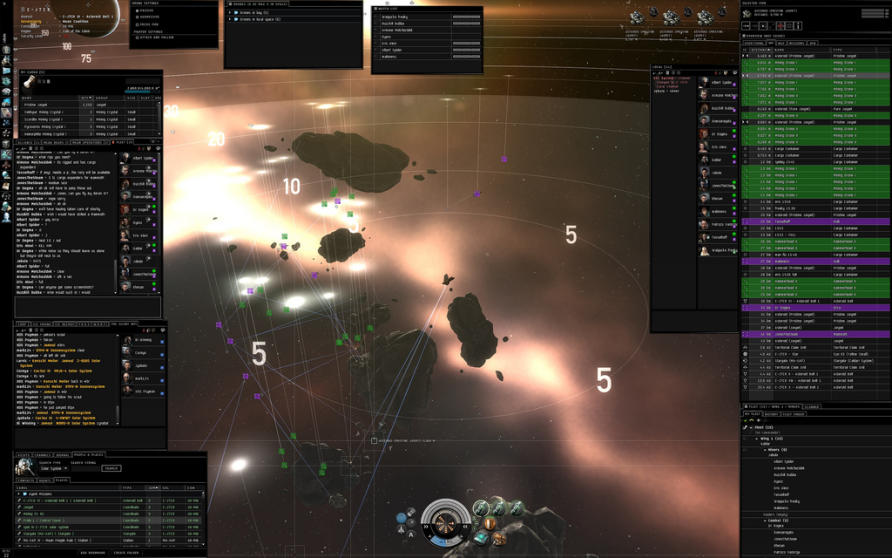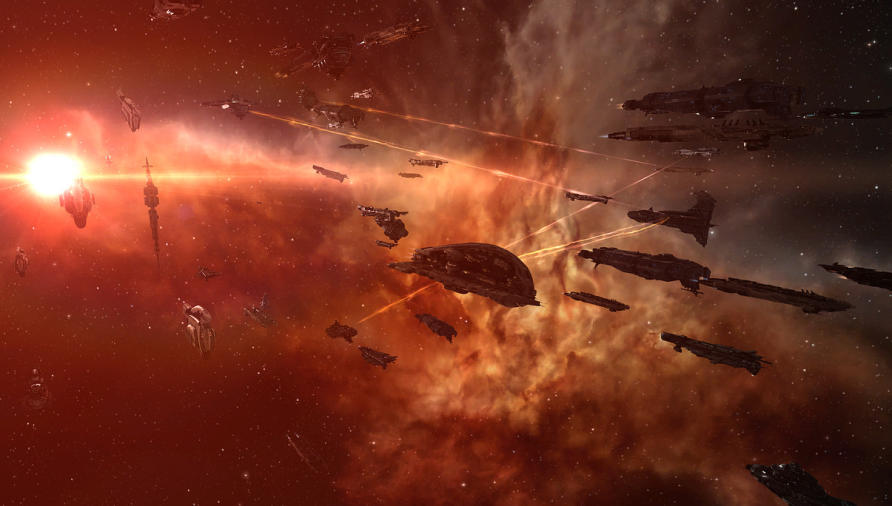A ruthless online space game is stretching the boundaries of fun, telling us about ourselves and the wider potential of gaming
How does this sound for some gaming fun … or not?
You spend hours of computer gaming time building spaceships and learning a complicated combat system that requires working a spreadsheet. Then you fly into space where there are no rules, where you can’t trust anyone, and where you are likely to get blown up and stolen from by online gangs of bullies, potentially losing all you had invested hours in building.
No thanks, just pass me the remote.
But for over half a million people the massive multiplayer online space game EVE Online is right up there with their idea of fun. It is a gaming phenomenon that is now attracting serious academic study as it pushes the boundaries of what constitutes ‘fun’ for people. Its longevity and success is posing deep questions about what we want from games, what they can tell us about ourselves, as well as suggesting new avenues for applying gaming concepts to the real world.
It is the real sense of meaning that can be generated in otherwise frivolous virtual worlds that is key to EVE’s success and perhaps the wider applicability of gaming, says University of Melbourne human computer interaction researcher Dr Marcus Carter.
Unlike most online games, EVE, launched in 2003, imposes serious consequences for failure, and creates a harsh and cold environment where there is no reset. Once a player takes an action it can’t be taken back or replayed, and the impact can affect every other player in the game.
“EVE can generate an enormous amount of meaning because as in the real world every decision can only ever be made once,” says Dr Carter, who has edited the first book to examine the EVE world, Internet Spaceships Are Serious Business, published earlier this year.
“It shows the enormous breadth of ways in which games can be attractive to people. The appeal of EVE Online is completely alien to most people, but that is why I’m interested in it. It is a contrasting case that challenges how we think about virtual worlds and online communities,” he says.
In EVE, when players fight their space wars they risk permanently losing hundreds and even thousands of hours of game time that some will even have spent real money to acquire. For the players it is more than enough to focus the mind.
It encourages wholesale deceit and espionage that extends well beyond the game, including infiltrating off-game forums to sabotage competing alliances. Once there was even a plot by some players to cut the power to an enemy’s house in London to take them out of an upcoming battle. Sometimes players are forced to set their alarms for the middle of the night so they can get up in time to defend themselves against co-ordinated attacks launched from different time zones.

To protect themselves players band into alliances, some of which boast tens of thousands of players. The largest has 40,000 members, is led by one player named The Mittani, and is known appropriately as The Imperium. The hundreds of thousands of players have in effect evolved their own Star Wars and made their own stories, some of which have been compiled into a book.
real world conflict
And just as the game intrudes on the real world, the real world intrudes on the game. When Russia invaded the Ukraine in 2014 a group of Ukrainians players who were allied with some Russian players suddenly betrayed their partners and defected.
“EVE Online shows that negative things can be part of the attraction of playing games – that ‘play’ can involve struggling to survive in a hard, ruthless and high stakes world. People will question how it can be fun to be stolen from, to be lied to, and to be victimised. But for EVE players it is fun, and that is really interesting,” says Dr Carter.

“By playing a game we are pursuing an emotional experience such as fun or excitement. But people don’t realise how often the experience we seek in games can be something other than frivolous, but something serious,” he says. “It suggests that gaming and virtual worlds can be highly effective in motivating people toward achieving goals whether they are personal or professional.”
The key to EVE Online is that the game takes place on a single computer server, distinguishing it from other massive multiplayer online games such as World of Warcraft that take place on multiple servers, putting the virtual world into compartments. But in EVE there is only one world with all 500,000 players in it. And the game designers have taken a back seat, leaving it to the players to create their own play and providing little protection for players from each other.
In such a world it is no surprise that players band together and that alliances are perhaps dispiritingly based on real world ethnicities and cultures. EVE players are overwhelmingly male, white and work in IT. But Russians band with Russians and Reddit users band with Reddit users.
It shows that social prejudice transcends the real world.
“In a game that forces you to trust people when you can’t actually trust anyone, it is no coincidence that players band together with people that seem to be like you,” Dr Carter says.
“It is depressing, but it is also comforting that perhaps this is simply what people are like and that the more we realise that the more we can think about what we can do to stop that affecting our societies in negative ways.”
The game also puts a premium on building social skills, says Dr Carter. He describes EVE Online as a form of “social combat” in which players learn to deceive and spot deception. Some players even report becoming more socially confident through playing the game.

At the same time, the absolute dependence of EVE Online players on each other in a bleakly unforgiving environment means learning to trust someone is crucial to survival.
“It raises the stakes of in-game friendships because people have to be better friends in order to trust one another,” Dr Carter says.
How EVE Online encourages players to interact could have important implications for how we use virtual worlds and gaming ideas for other purposes such as teaching, learning and promoting social interaction for isolated people such as the elderly, Dr Carter says.
“By studying games like EVE that are on the boundary of what games can be, we can appreciate that the space for games is wider than what we may initially have anticipated.”
The tagline for the 1979 movie Alien was “in space no one can hear you scream.” But when it comes to EVE Online the screaming is audible … and worth listening to.
Banner image: Wake Up Freeman/Flickr